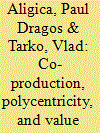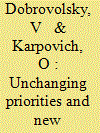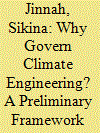| Srl | Item |
| 1 |
ID:
127831


|
|
|
|
|
| Publication |
2014.
|
| Summary/Abstract |
Revisiting the theory of institutional hybridity and diversity developed by Vincent and Elinor Ostrom to cope with the challenge of the "neither states nor markets" institutional domain, this article reconstructs the Ostromian system along the "value heterogeneity-co-production-polycentricity" axis. It articulates the elements of a theory of value heterogeneity and of the fuzzy boundaries between private and public. It rebuilds the model of co-production, clarifying the ambiguity surrounding a key technical public choice theoretical assumption, and it demonstrates (a) why it should not be confused with the Alchian-Demsetz team production model and (b) how co-production engenders a type of market failure that has been neglected so far. In light of this analysis, the article reconsiders polycentricity, the capstone of the Ostromian system, explaining why polycentricity may be seen as a solution both to this co-production market failure problem and to the problems of social choice in conditions of deep heterogeneity. It also discusses further normative corollaries.
|
|
|
|
|
|
|
|
|
|
|
|
|
|
|
|
| 2 |
ID:
178127


|
|
|
|
|
| Summary/Abstract |
In Latin America and Southern Africa, norms on violence against women have developed with ups and downs, not simply in reaction to global norms, but sometimes even preceding global norm diffusion or surpassing it in terms of scope, framing and binding character. The classic global-to-local account with a single source of norm creation cannot capture these dynamics. Including the regional level in a dynamic model of norm diffusion enables us to understand the changing contents of a norm and to acknowledge transregional agency. We show (1) how norm contestation is an ongoing, multidirectional and polycentric process; (2) how the regional level opens up opportunities for feminists and femocrats; and (3) under which conditions regional norms can be both more progressive than global ones and more adapted to regional needs, and, in turn, are thus able to strengthen the ‘global’ norm.
|
|
|
|
|
|
|
|
|
|
|
|
|
|
|
|
| 3 |
ID:
180761


|
|
|
|
|
| Summary/Abstract |
RUSSIA strives to act as constructively as possible in the international arena" - this is one of the most significant statements that Russian Foreign Minister Sergey Lavrov made at an annual press conference on the results of Russian diplomacy [2]. And it is fundamentally important today, when major changes in the global situation, triggered this time by the coronavirus pandemic, have made it an urgent task for international actors to develop the most rational approaches to the new challenges and to ensure national interests in the new situation.
|
|
|
|
|
|
|
|
|
|
|
|
|
|
|
|
| 4 |
ID:
160059


|
|
|
|
|
| Summary/Abstract |
Despite the important risks, uncertainties, and potentials surrounding emerging climate engineering technologies, governance of these technologies is lacking. This article asks: how can rationales underlying governance demand for climate engineering technologies inform strategies for governance design? It posits that demand rationales can be coupled with broad insights from theories of global governance to initiate governance proposals and discussions surrounding these emerging technologies. It proposes a preliminary framework that considers how the constellation of functional, strategic, and normative demand rationales for climate engineering technologies can inform the appropriate control mechanisms and degree of polycentricity in governance design.
|
|
|
|
|
|
|
|
|
|
|
|
|
|
|
|